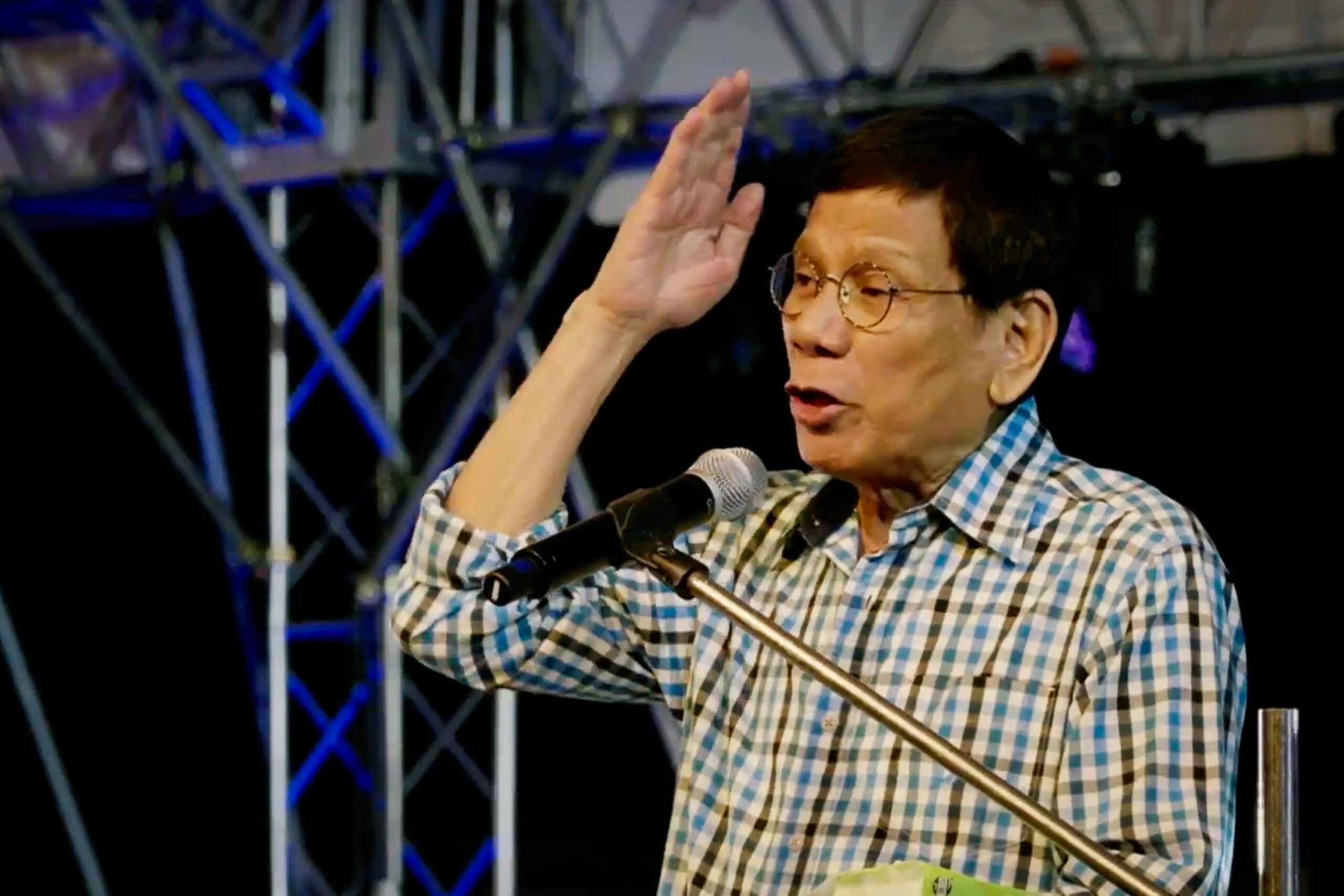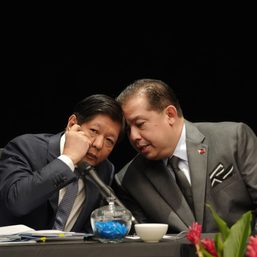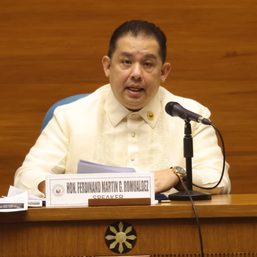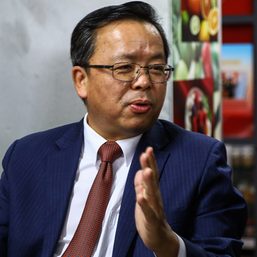SUMMARY
This is AI generated summarization, which may have errors. For context, always refer to the full article.

CAGAYAN DE ORO, Philippines – Officials from Mindanao cold-shouldered former President Rodrigo Duterte’s call to revive a movement for Mindanao independence even as organized governors and mayors conveyed their dismay over the squabbling between the Marcoses and the Dutertes, warning of its potential to fragment the nation.

“It won’t prosper. Don’t Mindanaonons feel that they are Filipinos?” said Senate Minority Leader Aquilino “Koko” Pimentel III of Duterte’s announcement of a revived movement for Mindanao independence on Friday, February 2.
Pimentel, who hails from Cagayan de Oro, served as the first Senate president during the Duterte administration. He later lost the top Senate post and clashed with the former president’s supporters who snatched the leadership of the then-administration Partido Demokratiko Pilipino-Lakas ng Bayan (PDP-Laban) from him. The party was founded by his father, the late Cagayan de Oro mayor and senator Aquilino “Nene” Pimentel Jr.
On January 30, Duterte told a news conference in Davao that he had asked former House Speaker and Davao del Norte Representative Pantaleon Alvarez to lead the movement because he was among the first to circulate papers “about the desirability of Mindanao seceding from the Republic of the Philippines.”
Inspired by Canoy
Earlier that same day, Alvarez told Cagayan de Oro-based broadcaster Magnum Radio that his group drew inspiration from the late Reuben Canoy, who was among the first to advocate Mindanao independence.
Canoy, a former Cagayan de Oro mayor, had subsequently mellowed down on his advocacy and became a member of Duterte’s 25-member Consultative Committee (ConCom) that drafted proposed changes to the 1987 Constitution. However, Duterte did not act on the committee’s recommendations.
Duterte’s announcement came just two days after he lambasted his successor’s administration, including First Lady Liza Araneta-Marcos and Speaker Martin Romualdez, for allegedly being behind the so-called people’s initiative to amend the Constitution. He said it was meant to perpetuate the Marcos family in power.
‘Political’
Bangsamoro Autonomous Region in Muslim Mindanao (BARMM) Chief Minister Ahod “Al Haj Murad” Ebrahim told reporters in Cotabato City that he saw Duterte’s move to revive calls for Mindanao independence as the former president’s way of flexing his “political” muscle.
“I think it’s more political…. [He’s] trying to use it for his political [agenda],” Ebrahim said.
But Ebrahim also cautioned against the so-called people’s initiative to amend the 1987 Constitution even as he raised questions about the timing of the campaign.
He said, “It can be used for political [purposes].”
Ebrahim is the chairman of the Moro Islamic Liberation Front (MILF), a former rebel group that had fought for greater autonomy for a predominantly Muslim region in Mindanao. It abandoned its call for the region’s independence and later agreed on a political settlement with the government in 2012, a move which led to the creation of the BARMM.
Rejected by governors
The League of Provinces of the Philippines (LPP), an organization composed of governors, rejected renewed calls for Mindanao independence.
In a February 2 statement entitled, “We are all Filipinos,” LPP members, particularly governors from Mindanao, said they do not support Duterte’s call for Mindanao to secede.
The LPP, incidentally, is headed by South Cotabato Governor Reynaldo Tamayo Jr., a Mindanao-based provincial chief executive.
“While the proposal promotes self-determination by its people to chart their future, it is myopic and parochial in [a] world that is becoming open and borderless. It destroys the integrity of the territory of the nation… It promotes the division of a nation seeking to be united in diversity and distinctions. It is motivated by politics rather than a genuine regard for autonomy and decentralization,” read part of the LPP statement.
The organization said it also “rejects attempts to split the nation into small states and governments that only hinder national progress and development.”
It added, “At this juncture, or any time in the future, we need a nation that is united and undivided…. We may be different, but we are all Filipinos.”
The LPP released the statement on Friday, which marked the 37th anniversary of the ratification of the 1987 Constitution.
Mayors’ stance
On the same day, a coalition of local chief executives advocating good governance also expressed concern over what it saw as escalating political divisions that threatened to fragment the nation.
The group, Mayors for Good Governance (M4GG), said it noted that public discussions surrounding constitutional matters have taken a turn, and contributed to squabbling between two political factions, obviously referring to the bickering groups of President Ferdinand Marcos Jr. and Duterte.
The mayors’ group said the intense political discord only added to the problems that the country faces such as the high prices of goods, insufficient workers’ wages, and rampant corruption.
It appealed to the warring groups, “Sa ating mga kapwa lingkod-bayan: unahin natin ang kapakanan ng mamamayang Pilipino at huwag na tayo dumagdag sa mga problema nila.”
(To our fellow public servants: let us prioritize the welfare of the Filipino people and refrain from adding to their problems.)
The M4GG represents 159 local chief executives and is led by Baguio Mayor Benjamin Magalong, Quezon City Mayor Joy Belmonte, Pasig Mayor Vico Sotto, Dumaguete Mayor Felipe Remollo, Marikina Mayor Marcy Teodoro, Isabela City Mayor Sitti Hataman, and Mayor Rommel Arnado of Kauswagan, Lanao del Norte.
Budget problem
Meanwhile, the chairman of the House committee on constitutional amendments, Cagayan de Oro 2nd District Representative Rufus Rodriguez, cautioned against the revived call for Mindanao independence.
“President Duterte’s proposal for Mindanao independence has to be reviewed carefully. We have to know the reasons why [there is a call for] independence now and the procedure to get there. This idea of secession is stoking the fire against the administration of President Ferdinand ‘Bongbong’ Marcos Jr., who is just one and a half years in office. We should give a chance to the new President to implement programs for Mindanao,” Rodriguez told Rappler on Friday.
Rodriguez said any movement for Mindanao’s independence will not gain traction if the government gives the country’s second-largest island a bigger budget for its development.
He said seven of the 10 poorest provinces in the country are in Mindanao, which was given only 16% of the 2024 national budget.
“Mindanao produces 22% of the national wealth. Why only 16%?” said Rodriguez, adding that inequality was “the reason behind why the idea of secession is being entertained.”
Rodriguez, however, told Rappler that Mindanao did not receive a bigger share of the national budget during the six-year Duterte administration.
“Not so much also during President Digong’s (Duterte’s) time,” Rodriguez said. – Rappler.com
Add a comment
How does this make you feel?



![[Vantage Point] Philippine economic reforms run into headwinds](https://www.rappler.com/tachyon/2024/05/ph-economic-headwind-may-2024.jpg?resize=257%2C257&crop_strategy=attention)
![[In This Economy] A counter-rejoinder in the economic charter change debate](https://www.rappler.com/tachyon/2024/04/TL-counter-rejoinder-apr-20-2024.jpg?resize=257%2C257&crop=267px%2C0px%2C720px%2C720px)
![[In This Economy] Marcos’ POGO ban is popular, but will it work?](https://www.rappler.com/tachyon/2024/07/thought-leaders-marcos-pogo-ban.jpg?resize=257%2C257&crop=255px%2C0px%2C720px%2C720px)
![[Rappler Investigates] POGOs no-go as Typhoon Carina exits](https://www.rappler.com/tachyon/2024/07/newsletter-graphics-carina-pogo.jpg?resize=257%2C257&crop=424px%2C0px%2C1080px%2C1080px)


















There are no comments yet. Add your comment to start the conversation.